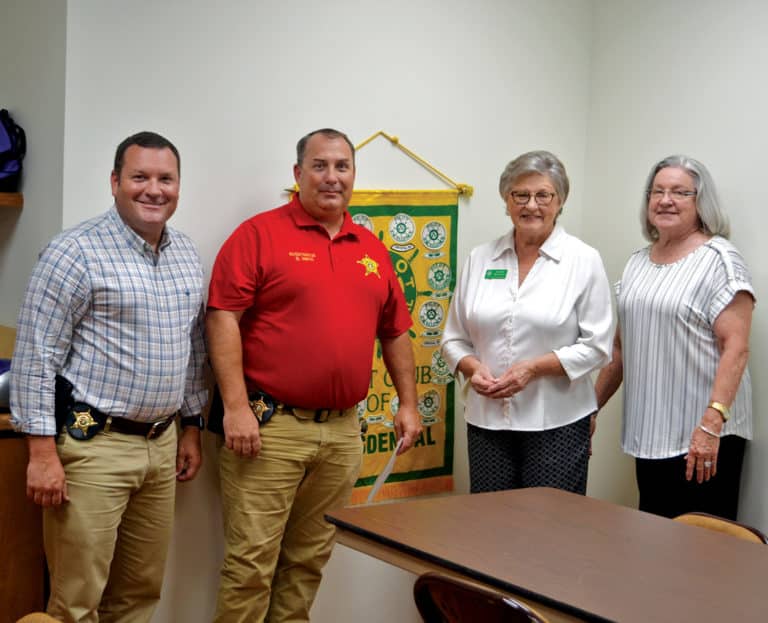Photo: Etowah County Sheriff’s Office representatives accept a $1,000 donation from the local Pilot Club at its September 22 meeting. Pictured, from left: Public Information Officer Captain Josh Morgan, Investigator Brian Smith, Pilot Club Secretary Sherre McGinnis, Pilot Club President Carolyn Hammond. (Emma Kirkemier/Messenger)
09-29-2022
By Emma Kirkemier, News Editor
The Pilot Club of Gadsden donated $1,000 to the Etowah County Sheriff’s Office for Project Lifesaver, presenting the check at its September 22 meeting.
The sheriff’s office received a matching check from the Etowah County Anchor Club for a total donation of $2,000.
Project Lifesaver is defined by sheriff’s office Public Information Officer Captain Josh Morgan as “a system for tracking clients with Alzheimer’s, dementia or persons with autism in the event they wander away from their caregiver.”
The program provides waterproof tracking devices on vinyl armbands for patients to wear, which can be tracked via radio signal by police if the patient is reported missing.
According to Investigator Brian Smith, who oversees Etowah County’s Project Lifesaver program, all recent officer callouts have ended in finding the missing person or their armband.
“We’ve always been successful [searching] on the ground,” Smith said. “We have a Critical Response Team. So if we have a Project Lifesaver client missing, we already have assigned people to that team, and we get notified and we all disperse and go to the scene then. When something comes out about a Project Lifesaver client, the deputies get the information because they’re already out and about. Then our team gets called out to go help search. So it’s a pretty quick response.”
The devices have a radius of about two miles, not accounting for interference from surrounding structures.
“If we can circle the area that we know (the client was seen), we can have several of the locators around,” Smith said. “We have five, I think, of those, and we can go from different angles and try to triangulate where they’re at. It’s been pretty efficient.”
Etowah County was able to join Project Lifesaver because of a Pilot Club donation some 30 years ago, and the club continues to fundraise for it.
“We haven’t been able to do many fundraisers to help with Project Lifesaver the past two years because of COVID,” said Pilot Club Secretary Sherre McGinnis. “All of our fundraisers are in person, so that just cut out everything. And we are down in membership, but we work hard. We’re so proud of the work that y’all do.”
Project Lifesaver is an international 501(c)(3) nonprofit dedicated to “bringing loved ones home.” It partners with law enforcement and other first responders, providing tracking devices and locators.
According to the Project Lifesaver website, the program targets “individuals with cognitive disorders who are prone to the life-threatening behavior of wandering.” Etowah County has around 25 individuals, both children and adults, enrolled in its program.
“The devices are waterproof, and they’re meant to be worn all the time,” Smith said. “So the only time they come off is when we go there to change the battery. We’ll cut the band, change the battery and put a brand-new band on every two months.”
Project Lifesaver is offered on a county-by-county basis.
“There’s other programs out there, and some of them are GPS-based that a lot of the counties are going to — just better technology,” Smith said. “[Instead of] an on-the-ground search, it’s a GPS where you can pull up a screen and see exactly where that person is. We’ve actually been looking into something like that.”
Such a program could allow caregivers to locate patients themselves, possibly eliminating the need to call for first responders.
Smith explained that while the sheriff’s office is looking at new tracking services, the department would likely continue using Project Lifesaver.
“We may hold onto that because there’s patients that like to swim or like to go to water or things like that,” he said. “The Project Lifesaver ones are waterproof. The other ones are not; they’re water-resistant.”
According to Smith, Project Lifesaver devices just work better for certain clients. They are harder to remove, and many young patients often interact with water.
“This is great, but the GPS might put us in the right direction,” said Morgan. “If it did get wet and go out, at least it brought us to a better location. That’s what he means by maybe doing both; it’s not just one or the other. We don’t want to get rid of this because this is good too, but maybe the GPS could help speed things up.”
Pilot International is a service organization with two main sponsorships: Project Lifesaver and BrainMinders, an educational program for elementary school students that emphasizes the importance of wearing a helmet and protecting themselves from brain injury.
The Anchor Club is a subsidiary of Pilot International which offers membership and even scholarships to middle, high school and college students. The local club’s donation of $1,000 was made by Anchor Club sponsor Sammye Hill in honor of a late member.
“The kids all knew about Project Lifesaver,” McGinnis said. “And so her parents asked that any donations that came in go to Project Lifesaver.”





